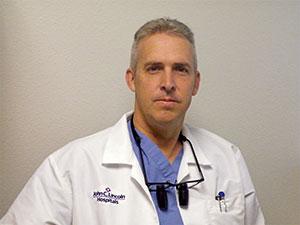The Citizen Soldier
Dr. Brian Trainor’s career has taken him from recording studios to military planes to operating rooms in what he himself describes as a “Forrest Gump-like life.” But his achievements seem more like markers of a modern-day Renaissance man.


Dr. Brian Trainor ’82 is remarkably calm, considering he’s about to leave his loved ones, his successful medical practice, and his country for the next year. He wasn’t expecting the Air National Guard to schedule him for deployment to Djibuti, Africa, in early January—still, he’s making the best of it. “I think it’s important to go,” he said in early December. “Morally, it’s the right thing to do.”
His aplomb comes from knowing that this is only the latest twist in a lifetime of change—the newest chapter in what he describes as a “Forrest Gump-like life.” Like Gump, he’s stumbled into all sorts of careers and opportunities over the years, leading him from recording studios to military planes to operating rooms. Still, it’s hard to believe that these achievements have been the result of Gump-esqe dumb luck—they seem more like markers of a modern-day Renaissance man.
Music found him first. Trainor began playing the piano at age 5, and at 9, held his first recital. By his freshman year at TCNJ, “I was a devoted musician and figured that’s what I’d do,” he said. He majored in music and physics—both of which interested him because “you really get to analyze what’s going on”—and went on to record in studios and perform in clubs throughout the region.
After graduation, he enrolled at Columbia University to study auditory biophysics—the scientific study of musical sound—but three years in, the army reserves called. When he’d signed up for the reserves with a few friends at TCNJ, “my thought was four years and out,” he says. But when the reserves offered him the chance to learn to fly planes, he couldn’t turn it down.
He came back in command of a helicopter unit, and at the same time, “some people started talking to me about clinical [ear, nose, and throat] and going to medical school.” Once again, an invisible force was guiding Trainor’s life, and who was he to fight it? He enrolled in Biology 1 and 2 at TCNJ and soon after was accepted to an osteopathic medicine program.
After working in Saint Barnabas Medical Center and New York University, he opened a private practice in Scottsdale, AZ, in 2005, specializing in otolaryngology and performing complex, eight-hour head and neck surgeries on cancer patients.
His practice was successful, and life was good.
Then, in October of last year, Trainor was given official orders that he would be deployed to Djibuti in January 2010 as the pilot-in-command on RC-12 and C-12 planes. “We’ll be moving people around the areas of Africa where they think Al Qaeda or the pirates may be,” he says. “The belief is that Africa is ripe to be the next Afghanistan.
“Personally, my view is that nothing good’s going to come of this,” he adds. “But as an older guy, I think it’s important to serve. There is a definite role for someone who’s parental age. A lot of the young guys think they’re invincible—they’re going to go [into a dangerous situation] no matter what. But when someone who is their father’s age says, ‘We’re going to wait two or three days,’ they listen.”
Disparate as his musical, medical and military pursuits have been, Trainor recognizes the connections between them, tracing everything back to his early love of music. “As a musician, you learn to do things in real time, and that translated into doing surgery well,” he says. “It also translated into flying and using that big piece of machinery as I would a synthesizer or keyboard.”
A musician must also be “very sensitive to what your audience feels about your concert,” Trainor adds. “A lot of that translated into my military experience—you have to get a feel for what people are thinking. And of course, that’s helped me in medicine, as well.”
When he returns from Djibuti, Trainor hopes to slow the frantic pace that’s defined his adult life. “I hope it’s the last deployment I have,” he adds. “I’d like to come back and retire from the military and keep being a surgeon.”
In the meantime, he’ll be working on his newest project while in Africa: a screenplay.
Posted on February 22, 2010

